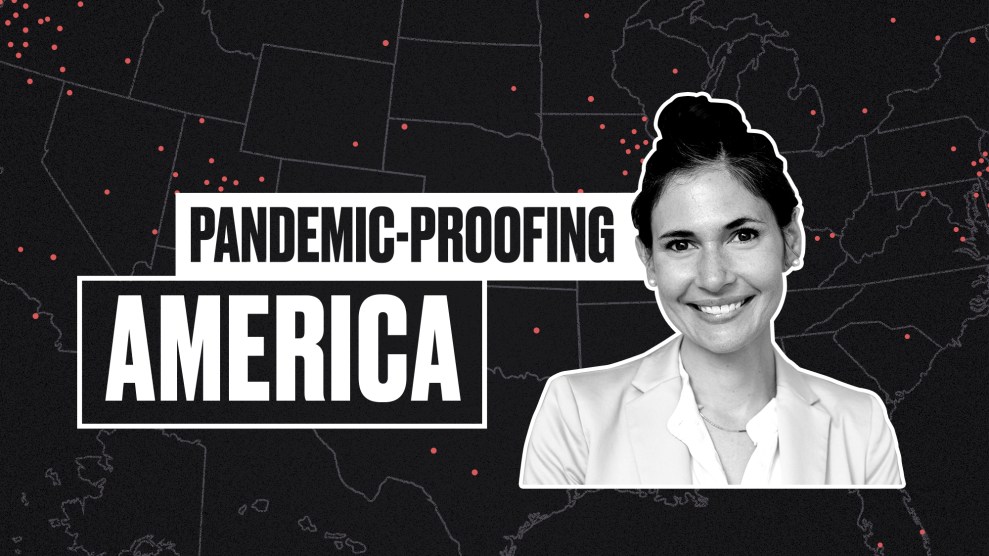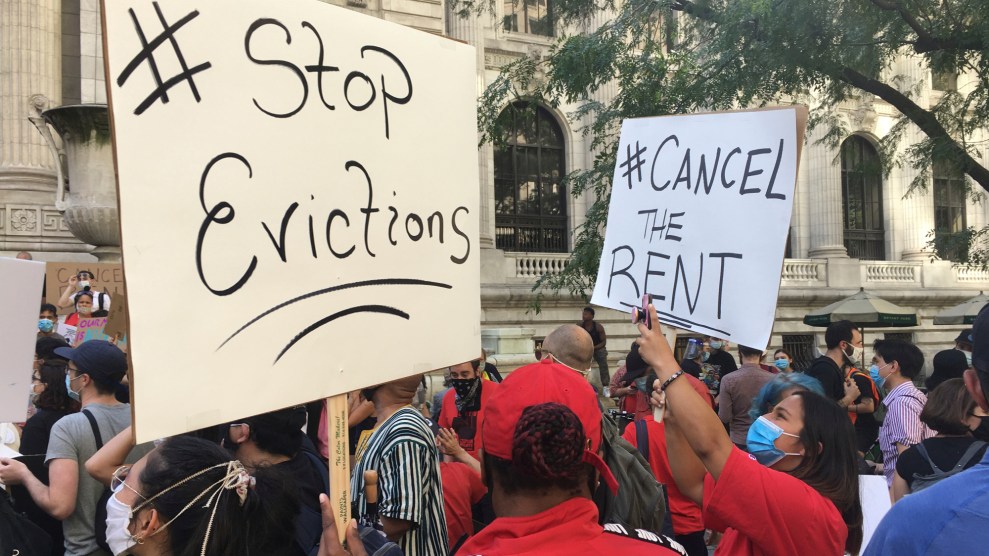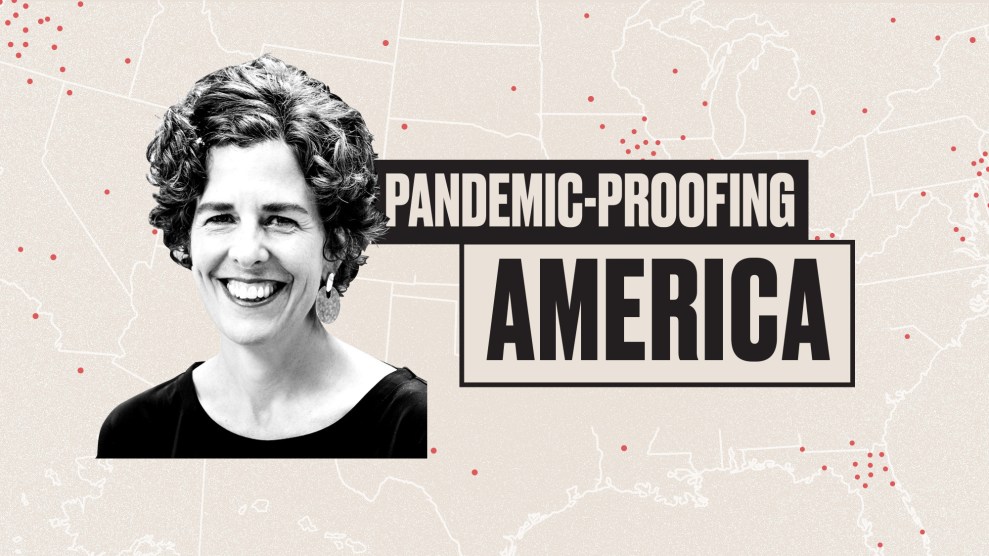
Mother Jones illustration; Courtesy of Julia Devanthéry
As the world grapples with the devastation of the coronavirus, one thing is clear: The United States simply wasn’t prepared. Despite repeated warnings from infectious disease experts over the years, we lacked essential beds, equipment, and medication; public health advice was confusing; and our leadership offered no clear direction while sidelining credible health professionals and institutions. Infectious disease experts agree that it’s only a matter of time before the next pandemic hits, and that one could be even more deadly. So how do we fix what COVID-19 has shown was broken? In this Mother Jones series, we’re asking experts from a wide range of disciplines one question: What are the most important steps we can take to make sure we’re better prepared next time around?
In 2013, Julia Devanthéry joined Harvard Law School’s Legal Services Center and specialized in teaching students how to represent tenants in housing disputes. In 2017, after witnessing how many clients were facing housing instability due to domestic violence, sexual assault, and stalking, she realized that students needed a more focused approach to representing them. So, she founded the Housing Justice for Survivors Project within the Center in order to train law students in what is known as a trauma-informed practice, one that focuses on domestic violence-oriented defense strategies against eviction, while also helping clients break leases without financial repercussions and find transitional housing.
In 2019, Devanthéry and her students won an important case in the Massachusetts Supreme Judicial Court after appealing an eviction order on behalf of a client who had fallen behind on payment of rent because her abusive partner was stealing her income. The court’s ruling in Boston Housing Authority v. Y.A. affirmed the right of domestic violence survivors in public housing to raise the Violence Against Women Act as a defense against an eviction procedure.
Now, with the coronavirus pandemic and stay-at-home orders often leaving victims of domestic violence trapped with abusive partners, the team’s eviction defense work has become even more urgent. Like several other states, Massachusetts enacted a comprehensive temporary moratorium in April prohibiting most residential evictions, but Republican Gov. Charlie Baker let it expire in mid-October. The same day the state’s eviction moratorium ended, Devanthéry warned that “without a moratorium in place, we will still see an explosion of homelessness now that evictions are allowed to go forward next week.” She forecasted “a humanitarian crisis” and a “completely preventable tsunami of homelessness.” She spoke to Mother Jones about the importance of states keeping bans on evictions in place, and why we need to be thinking past January 31, when the federal moratorium extended as part of the stimulus package Trump signed on Sunday is set to expire.
On the heightened vulnerability of survivors: A lot of our cases involve instances where victims are being brought to court—or their tenancies and housing benefits are being terminated—for reasons that are directly related to their experiencing abuse. Our clients get blamed, even though they are unable to exercise control over the person who was physically and emotionally hurting and systematically terrorizing them in their own homes. Because of the power dynamics in an abusive relationship, if the abusive partner refuses to put their name on the lease or to contribute income towards rent, that’s a violation of the housing program that could cause the victim to lose a voucher—which otherwise they would have had for the rest of their lives. We see that situation a lot where people are being held accountable for the actions of their abusers. But in reality, within the context of that relationship, they don’t have the power to compel the abuser to do anything, because the power is so skewed in the other direction.
On the importance of housing protections contained in the Violence Against Women Act (VAWA): A survivor reached out to us and shared that she was experiencing very significant physical and emotional abuse. Her partner was threatening to dismember her, and kill her and her daughter. The housing provider was going to terminate the Section 8 voucher, but we put together a letter where she asked for the protection of VAWA, which prevents people from losing housing subsidies and their homes as a result of domestic violence. We sent it over to the Housing Authority, and within a week-and-a-half they reversed their decision and allowed her to keep her housing subsidy—which she needed in order to be able to afford rent. It also spared her the re-traumatization of becoming homeless as a result of being in an abusive relationship. The abusive partner is incarcerated, and she and her daughter are safe and able to stay home for Christmas.
VAWA has not yet been reauthorized, and that’s an unspeakable shame on this Congress and the Republicans who obstructed it. There are many programs that serve domestic violence survivors but many funding sources are not available, and that hurts clients every single day. But the housing provisions built into VAWA do not expire, they still are the law of the land. I’m hopeful that, looking ahead to a new Congress, we might have some cause to be optimistic about the strengthening of the protections—especially when you have the author of VAWA in the White House!
On the trauma of eviction: Anyone who’s facing housing instability is panicked. It’s such a scary and overwhelming experience. Especially if you have a family and kids, thinking about where they’re going to go, how it’s going to impact school, how you’re going to explain to them that you have to pack up and leave without a place to go. What they’re facing is a sheriff or constable coming to their home—basically bursting through the door even if it’s locked—with movers, who are just strangers, who come into the home and start packing and removing belongings. Then they physically remove the tenant and their family from the property and put those belongings in storage. People lose property, essential documents, medication and eyeglasses, and all the things that people need for survival. It’s just a very violent experience in and of itself.
On how the pandemic has made everything worse: It’s been a really difficult time for our clients. While we were all ordered to stay home to keep ourselves and our community safe from the spread of the coronavirus, our clients basically have been required to stay in spaces that are the opposite of safe for them. They have to stay confined in spaces where their physical health and emotional and sexual autonomy are jeopardized. People have been dealing with a lot of extreme violence and having a very hard time accessing safe shelter alternatives, because the predominant model for emergency domestic violence shelters relies on congregate living spaces. Because there are fewer shelter spaces, what folks end up doing is going to live with family and friends in a way that also puts family units at risk of contracting the coronavirus. Or, they decide to stay in a very unsafe, violent situation because there are no alternatives. I have a number of clients who have coronavirus and are very sick. They are trying to deal with their safety concerns, take care of their kids, figure out what to do about housing, while also dealing with this deadly virus. There’s also limited access to courts, so it’s very hard to get access to restraining orders. When eviction cases are going forward virtually that’s a huge barrier for clients who maybe don’t have stable wifi or smartphones.
For people who are in abusive relationships to find a safe space to even just talk to a lawyer or a service provider is a real challenge. We’re having to be very creative about when and where we make appointments. That’s been incredibly stressful and scary. Then you layer on top of that the economic devastation of the virus, the suffering is just really unprecedented. Even though we’re not physically in our offices, and we’re not able to build rapport and trust with people in ways that we used to do—and that we hope we will do again in the future—the need for connection is as high as it’s ever been.
On the benefits and shortcomings of an eviction moratorium: People are facing loss of housing in such astronomical rates right now because the Massachusetts moratorium has been lifted. Some people are protected by the federal moratorium, but not everyone. While we had it, it was incredibly powerful and the result was that people were able to stay in their homes during one of the most difficult periods in our state’s and in our country’s history. They didn’t have to deal with the trauma and rupture of housing loss in the midst of the pandemic.
What we’ve been seeing since October has been a real surge in people reaching out to us for help. All of the advocates I’m connected with on the housing and the domestic and sexual violence side, everyone was just in disbelief that the state moratorium would be lifted. They just couldn’t imagine it. I think there were political factors that pressured the governor not to extend the moratorium again, and he just let it expire. Now, it’s a disaster. It’s complete chaos in the housing courts, and people are losing their homes and being evicted. We have a huge snowstorm right now—like a foot of snow. There’s a coronavirus surge and no place for people to go, and no financial resources to help them transition to appropriate alternative housing. It’s really just shocking and disappointing and outrageous. I don’t know how else to describe what I’m seeing.
On attempts to mitigate the harm: There’s a new study about the correlation between COVID-19 deaths and the lifting of state moratoriums. Keeping people housed and also allowing them to get access to dispute resolution and rental assistance would have saved lives. What eviction diversion initiatives aim to do is really positive; to reduce the total number of evictions that go through court by doing a variety of early interventions, to provide rental assistance to address non-payment, to do out-of-court mediation, and increase the number of free lawyers for folks who do end up in court. Unfortunately, what we have is a highly adversarial, punitive system of evictions alongside a diversion program that is not completely staffed up and not operating at full capacity. There’s not nearly enough money in rental assistance allocated to address the total amount of money owed by tenants across the state, and there aren’t lawyers yet for everybody who needs them. These are all great ideas but meanwhile the eviction machine is ramping up. People should not be evicted during this time, period.
On rental assistance and eviction records: There’s just going to be a huge amount of rental debt following people around after this crisis. We need a shift in how we’re conceiving of rental assistance. We should move away from a sort of welfare benefit model, where tenants have to go through cumbersome bureaucratic procedures to get access to money as a bargaining chip to use through the eviction process to keep them housed. Instead we should impose a moratorium that prevents evictions, but allows landlords to get access to 100 percent compensation for the rent that is owed while taking that off of the tenants’ ledger. That would be a much better way to run these programs and ensure that the financial strain caused by COVID-19 is not going to follow people around for months, or years, after the pandemic is over.
We’re also going to see a massive increase in the number of cases coming through the courts, and people who never had any contact with courts, as well as very low-income people dealing with poverty, are going to have eviction records. We’re going to see people who are just locked out of the rental market at a huge rate as a result of being brought through the court system because of the economic devastation of COVID-19. Legislation to allow people to seal their eviction records, forgiving the debt, and then making sure that eviction actions are not like zombie marks on everyone’s records are all really important.
On the need for long-term solutions: The lack of enough safe affordable housing for all creates a perpetual scarcity of resources for people dealing with poverty and impacts survivors in particular. We need a guarantee of safe, affordable housing for all. That means an expansion of affordable housing programs sufficient to meet the need, and increased protections against the loss of housing. Societally, we should approach housing as a basic need that everyone should have access to no matter their income—like healthcare or public education. In a world in which there’s a right to housing, everybody has an opportunity to have a place to live, no matter how poor they are, no matter how disabled they are, no matter what their needs are. That’s the world I’m working towards.
This interview has been edited for length and clarity.










